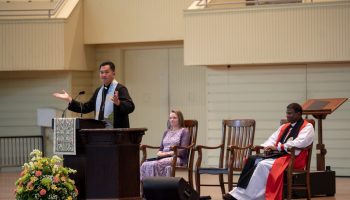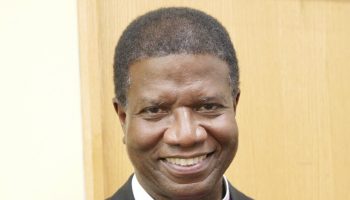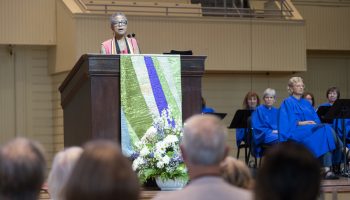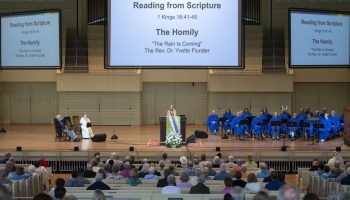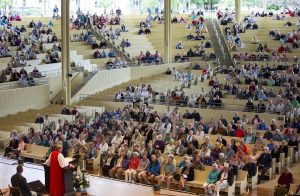
The Rev. Michael-Ray Mathews closed out his week as chaplain at Chautauqua preaching on “Go Outside, That’s Where the Action Is.” His text was Mark 16:1-8, the women at the tomb of Jesus.
Mathews told the congregation that they have reached the “final movement” to close a week of reflection on the Theology of Resistance.
“We have celebrated the women of the resistance in Exodus, the encounter of Moses and the burning bush, the disruption of Rizpah when her children were executed, and the reimaging of life between Jesus and the Syrophoenician woman,” Mathews said.
Many of these stories were strange, he said, and that they featured women was “not that intentional but it was a blessing. Amen?”
The congregation responded, “Amen.”
When Mary Magdalene, Mary the mother of James, and Salome went to Jesus’ tomb, they experienced encounter, disruption and reimagining. They were told to “go outside, that is where the action is”; that is where prophetic action takes place.
Mathews sang a psalm based on Psalm 19:14 that he had sung at the Sunday morning worship service.
“Let the words of my mouth bring you praise,” Mathews said. “May the words that I speak be seasoned with your love and grace. May the things, O Lord, that I choose to say bring glory, not shame, to your name this day. Let the words of my mouth bring you praise.”
In April 2015, it was Maundy Thursday — three days before Easter — and Mathews was in a panic. He had been invited to preach at a church in Indianapolis, and he did not know what he was going to preach about.
He was the guest preacher on the Sunday where every preacher is expected to “bring hope in a hopeless world, to preach the Good News with reckless abandon, the news of the victory of good over evil, of God over Empire.”
But his spirit was full of suffering, death and crucifixion because since August 2014, his life had been consumed by Michael Brown’s shooting in Ferguson. He was caught up in the uprising in Ferguson and the ripples it was causing across the nation.
“My sermons were cries of lament, confessions of complicity in white supremacy and calls to prophetic action,” Mathews said. “I was preaching Good Friday. I was preaching death, the threat of death and the reality of death in the black community.”
Mathews had been bold in preaching crucifixion, of speaking frankly about race, power, death and the church’s complicity.
“How could I show up on Easter and preach crucifixion, with all the children in their pretty dresses?” Mathews said. “There would be no Easter for anybody.”
But Easter is a time to preach of rising from death, the resurrection after crucifixion. Mathews had pledged himself to read the Gospel of Mark over and over again in 2015, so he returned to the text.
“As I reread the Resurrection text, I noticed the phrasing and found a message that connected the Resurrection to the post-Ferguson world,” he said.
The young man in a white robe that the women encounter in the tomb tells them: “He has been raised; he is not here. Go and tell the disciples and Peter that he is going ahead to Galilee.”
The women had come to the tomb to ritually anoint Jesus’ body with spices. They had believed he was the anointed one, the one sent by God. But they came with grief in their hearts for “one who died a state-sanctioned public death.”
“Jesus had been lifted on a cross as an example of what happens when you dare to disrupt Empire,” Mathews said.
There was a very practical concern that the women had to overcome — who would roll away the stone at the tomb entrance? When they arrived, it was already rolled away.
“A messenger of God, a man in a white robe was there,” Mathews said. “Once, I read it as a white man in a robe.”
The revolution began when the messenger told the women that Jesus was not there. He was raised and had gone before them to Galilee.
“Share this news with the others and go to Galilee,” the messenger said. “He ain’t here, sisters, so go outside.”
Mathews said that in the heat of Ferguson, Faith in Action implemented clergy conference calls for people to share what was going on in their towns, to pray for one another and to strategize on the message to give to the media, their congregations and the world.
But the clergy became increasingly anxious.
“They wanted clearer answers, a plan to guide them,” Mathews said.
His colleague, Pastor Michael McBride, finally told them to go outside.
“The No. 1 principle in organizing is that when in doubt, do a one-to-one,” Mathews said. “Talk to people who live closest to the pain. Just be in relationship and listen to the stories, dreams, fears and laments of the people. It will only happen if you go outside.”
Another colleague, the Rev. Traci Blackmon, said get out of the church.
“The young people are making church in the streets,” Blackmon said. “They don’t need our walls.”
“If they don’t need our walls, do we?” Mathews asked.
Most of the stories in Mark’s gospel take place outside, he said. The narrator goes out of the way to mention when Jesus is going inside a house or building.
“Actions on the inside have implications for the outside,” Mathews said. “Why does the church spend so much time inside? We try to get folks inside instead of getting our folks outside. That is a disconnect with the next generation.”
When the church is inside, Jesus is still in the tomb. There is a difference between having church and being church, Mathews said.
“We have to be the church that wades in the troubled waters, that is God’s healing force in the world,” Mathews said.
Mathews told the congregation that they need to “take up our cross, go outside and give ourselves away.” He said that so much happens outside of the building, and they should go outside.
Worship, Bible study and preaching need to be part of Black Lives Matter and the #MeToo movement, he said.
“The world needs to hear a liberating word, and it must be preached outside,” Mathews said.
The church stands inside the tomb, with the action inside the walls of the church.
“We need to take God’s message into the world, where policy sentences young people to a slow death,” Mathews said. “It is time to go outside.”
The Resurrection story in Mark ends abruptly. Mathews said that he did not know what to do with the verse about the women being too fearful to tell anyone that Jesus was alive.
“Somebody told the story,” he said. “Maybe there was another Mary there. Maybe Mary Lee Talbot took notes and wrote it in the Daily.”
Mathews said somebody said to the others, “Go to Galilee.”
“As we gather to go home or stay and re-group for another week,” he said, “the relevance for Chautauqua’s hopes for diversity, its examination of critical values, its goal to present ‘the best of human values,’ rests on thoughtful engagement in the real world.”
Who will roll away our stone, he asked the congregation.
“Perhaps the answer is the same: go outside,” he said. “Practice community, build community in the real world with your gifts, your contributions to society.”
Mathews said we have to practice community inside and outside.
“Diversity is a reflection of real relationships in real lives,” he said.
Mathews attended a planning meeting for the African-American Denominational House at Chautauqua. In addition to the plans for a house, a structure and for programming that includes relevant content and activities, he had one suggestion as a pastor and organizer.
“The structure and program need to be matched by the quality of relationships and encounters in the real world,” he said. “It is time to engage in a holy conspiracy among ourselves, others, and the sacred. If we are not cultivating moral imagination, we will experience Empire.”
The vision is in here, he said, pointing to his heart, and out there. Spread the message of revolutionary love.
“Let us all go outside,” he said.
Mathews ended his sermon with a call and response.
“Neighbor, he ain’t here,” he said. “Go outside and spread love, love, love. Amen.”
The congregation stood and gave him a standing ovation.
The Rev. John Morgan presided. David Green, an active Presbyterian elder at Bower Hill Community Presbyterian Church and Pittsburgh Presbytery, read the Scripture. Jared Jacobsen, organist and coordinator of worship and sacred music, directed the Motet Choir in “!Aleluya! Cristo resucito,” (Alleluia! Christ is Arisen”) by Luis Bojos. The Robert D. Campbell Memorial Chaplaincy provided support for this week’s services.

